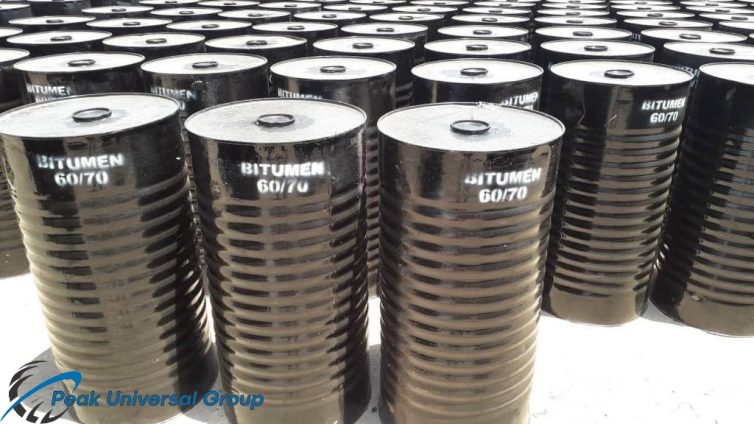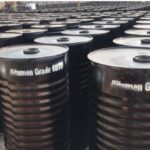
Environmental Impact of Bitumen 60/70
Bitumen 60/70, one of the most widely used paving grades in the world, plays a vital role in road construction. However, despite its performance and durability, it has raised several environmental concerns from extraction to disposal. Understanding its ecological footprint helps companies make sustainable choices.
🔬 What is Bitumen 60/70?
Environmental Impact of Bitumen 60/70 – Bitumen 60/70 is a penetration grade bitumen commonly used in road construction. The numbers 60/70 refer to the bitumen’s penetration value, which indicates the hardness of the bitumen. This value is determined through a penetration test, where a standard needle is allowed to penetrate the bitumen under specific conditions.
The result is measured in decimillimeters, with Bitumen 60/70 having a penetration value between 60 and 70. This grade of bitumen is semi-hard, making it suitable for road construction, roofing, and various industrial applications. (Uses and Applications of Bitumen 60/70: Road Construction, Roofing, Industrial Applications)
Bitumen 60/70 is produced by refining crude oil. The process involves the following steps:
1. Distillation: Crude oil is heated in a distillation column. Lighter fractions, such as gasoline and diesel, are separated from heavier fractions.
2. Vacuum Distillation: The residue from the initial distillation undergoes vacuum distillation to remove additional lighter components, leaving behind the bitumen.
3. Oxidation: The resulting bitumen can be oxidized to improve its properties. In the case of Bitumen 60/70, the oxidation process is controlled to achieve the desired penetration grade.
Characteristics of Bitumen 60/70
- Penetration Value: 60 to 70 decimillimeters
- Softening Point: 48 to 56 degrees Celsius
- Ductility: High ductility, ensuring flexibility in varying temperatures
- Viscosity: Suitable for application in moderate to hot climates
Uses and Applications of Bitumen 60/70:
-
Road Construction
Bitumen 60/70 is predominantly used in road construction for:
1. Asphalt Concrete: It acts as a binder in asphalt concrete, providing the necessary adhesion between aggregates.
2. Surface Dressing: It is used for surface dressing of roads to enhance skid resistance and waterproofing.
3. Pavement Maintenance: Bitumen 60/70 is used in various pavement maintenance techniques such as patching and sealing.
-
Roofing
Bitumen 60/70 is utilized in roofing applications due to its waterproofing properties. It is used in:
1. Bituminous Membranes: These membranes are applied on roofs to provide waterproofing and durability.
2. Shingles: Bitumen is a key component in asphalt shingles, offering protection against weather elements.
-
Industrial Applications
In industrial settings, Bitumen 60/70 is used for:
1. Adhesives: It is a key ingredient in adhesives used for various construction purposes.
2. Pipe Coating: Bitumen 60/70 is used to coat pipes, providing corrosion resistance and durability.
3. Waterproofing: It is applied in waterproofing foundations and basements to prevent water seepage.
🏭 Environmental Challenges of Bitumen 60/70
📊 Lifecycle Environmental Effects
| Stage | Environmental Concern |
|---|---|
| Crude Oil Refining | High CO₂ emissions, energy-intensive processes |
| Bitumen Production | Release of VOCs (Volatile Organic Compounds), carbon footprint |
| Transportation | Fuel consumption, risk of spillage during transit |
| Application (Paving) | Emissions during heating, health risks for workers |
| End-of-Life & Recycling | Difficulty in reuse, landfill buildup if not properly recycled |
🌡️ Emissions and Air Quality
-
VOC Emissions: Bitumen emits volatile organic compounds during heating, affecting local air quality.
-
Greenhouse Gases (GHG): The production and application phases contribute significantly to CO₂ and methane emissions.
-
Odor Pollution: Bitumen application produces strong odors, which can affect nearby communities.
🌿 Ecosystem and Soil Contamination
-
Bitumen spills or improper disposal can lead to soil contamination and water runoff pollution.
-
Toxic leachates can damage aquatic life and plant growth near storage or paving sites.
🔁 Recycling and Sustainability Opportunities
While bitumen is not biodegradable, it is recyclable. Technologies like Reclaimed Asphalt Pavement (RAP) allow reuse in new mixes, reducing environmental burden.
♻️ Benefits of Bitumen Recycling:
-
Reduces demand for virgin materials
-
Lowers production energy consumption
-
Minimizes landfill usage
-
Promotes circular construction practices
🧭 Industry Trends Toward Greener Alternatives
To minimize environmental harm, the bitumen industry is adopting:
-
Warm Mix Asphalt (WMA) to reduce application temperatures
-
Bio-based binders (e.g., from vegetable oils or lignin)
-
Additives that enhance recyclability
-
Emission capture systems during production
Positive Environmental Contributions
1. Durability: Bitumen 60/70 contributes to the longevity of roads and pavements, reducing the need for frequent repairs and replacements, which in turn minimizes resource consumption and waste generation.
2. Recyclability: Bitumen can be recycled and reused in road construction, reducing the demand for new raw materials and conserving natural resources.
Negative Environmental Impact
1. Greenhouse Gas Emissions: The production and application of bitumen result in the release of greenhouse gases, contributing to global warming.
2. Air Pollution: Volatile organic compounds (VOCs) emitted during the production and application of bitumen can contribute to air pollution.
3. Water Contamination: Bitumen spills and runoff from roads can contaminate water bodies, affecting aquatic life.
4. Resource Depletion: The extraction and processing of crude oil for bitumen production deplete non-renewable fossil fuels.
Mitigating the Environmental Impact of Bitumen 60/70
Sustainable Practices
1. Recycling: Enhancing the recycling of bitumen in road construction can significantly reduce the environmental footprint. Recycled Asphalt Pavement (RAP) is an effective method to reuse bitumen.
2. Emission Control: Implementing stringent emission control measures during the production and application of bitumen can help minimize air pollution.
3. Eco-friendly Alternatives: Research and development of eco-friendly binders, such as bio-based bitumen, can provide sustainable alternatives to conventional bitumen.
4. Efficient Usage: Optimizing the use of bitumen in construction projects to minimize waste and improve efficiency.
Regulatory Measures
1. Environmental Regulations: Adhering to environmental regulations and standards for bitumen production and application can help mitigate adverse environmental impacts.
2. Sustainable Sourcing: Sourcing bitumen from refineries with sustainable practices and lower environmental footprints can contribute to overall environmental sustainability.
Advantages and Disadvantages of Bitumen
Advantages
1. High Durability: Bitumen 60/70 provides long-lasting performance in road construction and roofing applications.
2. Waterproofing Properties: Its excellent waterproofing capabilities make it ideal for various construction applications.
3. Flexibility: Bitumen 60/70 maintains flexibility over a wide range of temperatures, reducing the risk of cracking.
4. Adhesion: It offers strong adhesion to aggregates, ensuring the stability of asphalt mixtures.
Disadvantages
1. Environmental Concerns: The production and application of bitumen contribute to environmental pollution and greenhouse gas emissions.
2. Temperature Sensitivity: Bitumen can become brittle in cold temperatures and soft in hot temperatures, affecting its performance.
3. Health Hazards: Workers handling bitumen may be exposed to health risks due to fumes and chemicals.
4. Resource Intensive: The production of bitumen is resource-intensive, relying on non-renewable fossil fuels.
Future Prospects of Bitumen
- Technological Advancements
1. Innovative Modifications: The development of modified bitumen with enhanced properties can improve performance and sustainability. Polymer-modified bitumen (PMB) is one such example.
2. Recycling Technologies: Advancements in recycling technologies can enhance the efficiency and quality of recycled bitumen, promoting its use in sustainable construction.
- Sustainable Alternatives
1. Bio-based Bitumen: Research into bio-based bitumen made from renewable resources offers promising prospects for reducing the environmental impact of bitumen.
2. Cold Mix Asphalt: The use of cold mix asphalt, which requires less energy for production and application, can contribute to sustainability in road construction.
- Market Trends
1. Increasing Demand: The growing demand for infrastructure development, especially in emerging economies, will drive the demand for Bitumen 60/70.
2. Sustainable Construction: The shift towards sustainable construction practices will influence the development and adoption of eco-friendly bitumen alternatives.
Peak Universal Business: Your Trusted Bitumen 60/70 Supplier
Why Choose Peak Universal Business?
1. Quality Assurance:
Peak Universal Business ensures the Highest Quality of Bitumen 60/70, meeting international standards and specifications.
2. Sustainable Practices:
Committed to sustainability, Peak Universal Business sources bitumen from refineries with eco-friendly practices and implements recycling initiatives.
3. Technical Expertise:
With a team of experienced professionals, Peak Universal Business provides technical support and guidance to ensure the optimal use of bitumen in your projects.
4. Customer Satisfaction:
Dedicated to customer satisfaction, Peak Universal Business offers reliable and timely delivery of bitumen products to meet your needs.
❓ FAQs – Environmental Impact of Bitumen 60/70
Is Bitumen 60/70 biodegradable?
No, bitumen is a petroleum-based product and is non-biodegradable.
How does bitumen affect air quality?
When heated, bitumen emits VOCs and particulate matter, which can degrade local air quality.
Can Bitumen 60/70 be recycled?
Yes. Bitumen can be reclaimed and reused in asphalt mixes, especially via RAP (Reclaimed Asphalt Pavement).
Are there eco-friendly alternatives to Bitumen 60/70?
Yes. Alternatives include bio-bitumen, emulsion-based binders, and WMA technologies with lower emission profiles.
What are the health risks during bitumen application?
Workers exposed to heated bitumen may inhale toxic fumes. Proper ventilation and PPE are essential.
✅ Conclusion: Environmental Impact of Bitumen 60/70
Bitumen 60/70 is a versatile and essential material in construction, offering numerous benefits for road construction, roofing, and industrial applications. However, its environmental impact necessitates the adoption of sustainable practices and innovations. By choosing Peak Universal Business as your bitumen supplier, you can ensure access to high-quality products, expert support, and a commitment to sustainability. As the construction industry evolves, the future prospects of bitumen will be shaped by technological advancements and the drive towards eco-friendly alternatives.
📣Call to Peak Universal Business: Source Eco-Responsible Bitumen Solutions
🔍Looking for environmentally responsible Bitumen 60/70 or want to implement greener asphalt practices? We in Peak Universal Business, supply All Penetration-grade bitumen suitable for your toughest applications.
👉 Request a Quote Today
📧 Email: [email protected]
📞 Phone: +971 4 878 2031
🌐 Visit: Penetration-Bitumen-Grade/
📦 Bulk Supply & RAP Integration Options Available
You can Read More about Price of Bitumen 60/70 Here
If You have any other Query or Question you want to ask, Please don’t hesitate to Contact Us.
- 0 comment





Leave a Reply